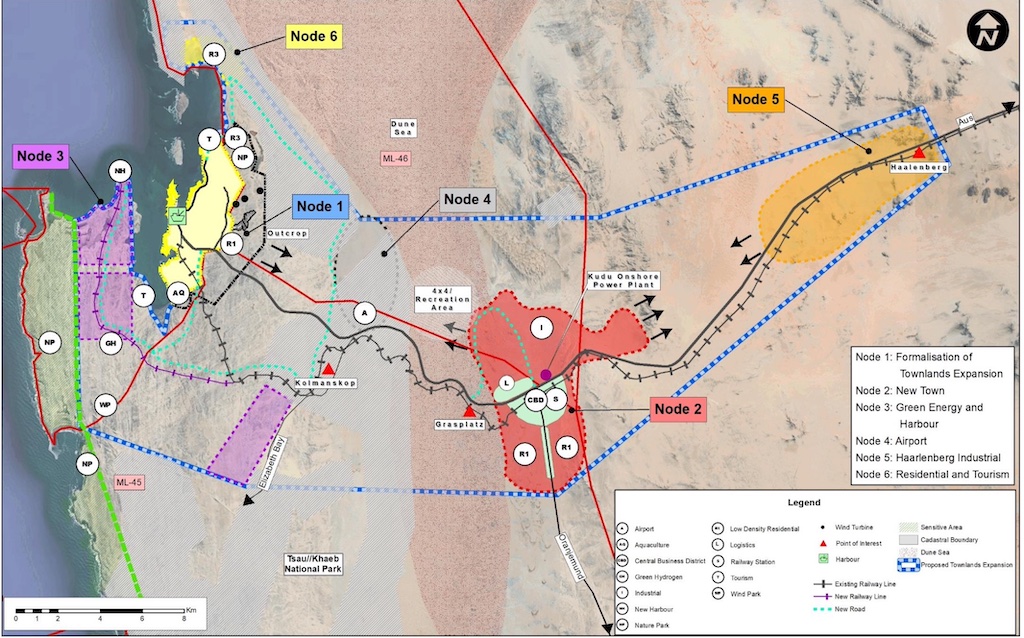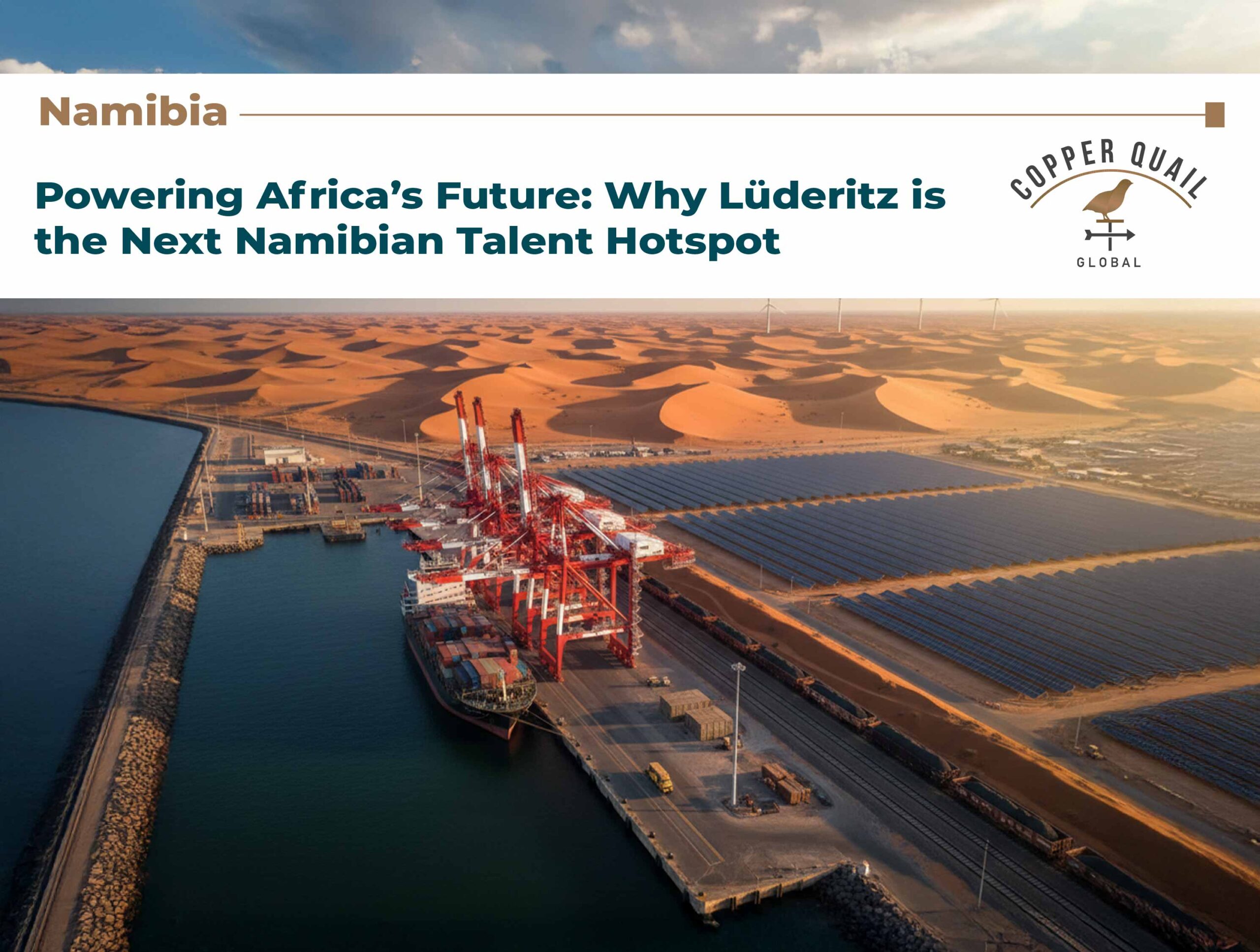The rhythmic churn of a busy port, the glint of new infrastructure under the desert sun, and the hum of ambitious development plans—this is the new reality for Lüderitz, Namibia’s historic and increasingly strategic southern coastal town. Once a remote desert outpost famous for its diamond-era ghost town, Kolmanskop, and rich maritime history, Lüderitz is rapidly transforming into a major economic hub. For businesses and talent across the continent, this transformation signals a wealth of new opportunities, particularly in key sectors like logistics, energy, and human capital.
As a seasoned Human Capital Solutions Partner with over 15 years of experience navigating the complexities of the African market, Copper Quail Global recognizes that where major infrastructure and industry go, the demand for specialized talent follows. Lüderitz’s comprehensive expansion—spanning port infrastructure, railway links, a burgeoning blue economy, and groundbreaking green energy projects—makes it a prime candidate for the next significant talent boom in Southern Africa.
From Fishing Port to Logistical Powerhouse: The Infrastructure Boom
Lüderitz, Namibia’s second port, is undertaking a profound metamorphosis driven by its strategic location and a surge in mining and maritime activity. The port’s initial shallow-water capabilities have been systematically upgraded over the last two decades, but recent initiatives demonstrate a new level of ambition.
The current facility has reportedly reached 95% berth occupancy, necessitating a critical second wave of expansion. A major N$2 billion (approx. $112 million) port expansion program is now underway, with the first phase scheduled for completion by 2027.
This program isn’t merely a maintenance exercise; it’s designed to fundamentally change the port’s capacity and function:
Massive Capacity Increase: Annual cargo handling capacity will be dramatically boosted from three million to six million tons by 2027.
Quay Wall Extension: The project includes the extension of the quay wall by 250 meters in Phase 1, reaching a total of 700 meters upon full completion.
Angra Point Deepwater Port: Longer-term plans include the development of a new deepwater port at Angra Point, vital for accommodating the larger vessels that are essential for future oil, gas, and major cargo exports.
The impetus for this massive infrastructure spend comes directly from the growing demand for logistics and export capacity. Manganese from South Africa’s Northern Cape is a primary driver, with volumes passing through Lüderitz increasing to nearly one million tons per annum. This growth highlights the critical need for robust rail links.

Connecting the Dots: Revitalizing the Rail Network
Logistical efficiency hinges on seamless connectivity. Recognizing this, Namibian authorities have prioritized linking the port directly to the national railway system.
Lüderitz-Aus Rail Link: The rehabilitation of the 120-kilometre rail line between Lüderitz and the inland center of Aus was completed in 2015, effectively connecting the port to the national grid.
Manganese Transport Goal: The objective is to transport over 2 million tons of manganese annually via this rail-and-road network.
This revitalization generates immense demand for skilled logistics, rail engineering, and supply chain management professionals. For businesses seeking to optimize their Southern African supply routes, Lüderitz is positioning itself as a highly viable alternative to more saturated ports.
The Energy Revolution: Green Hydrogen, Oil, and Gas
While logistics provide the foundation, the most profound future growth for Lüderitz lies in its pivotal role in Namibia’s emerging energy sector. This is where the demand for highly specialized, top-tier talent will be at its peak.
Green Hydrogen Leadership
Namibia is positioning itself as a global leader in green hydrogen production, and Lüderitz is central to this vision. Blessed with abundant sun, the area is perfectly suited for generating the renewable power needed for electrolysis. This initiative will require:
Renewable Energy Experts: Solar farm development, maintenance, and grid integration specialists.
Chemical and Process Engineers: For the hydrogen production and storage facilities.
Project Managers: To oversee the complex, large-scale energy projects.
Offshore Oil and Gas Excitement
The massive Venus (TotalEnergies) and Graff (Shell) offshore discoveries in the Orange Basin are situated relatively close to Lüderitz. This proximity means that the port is an ideal candidate to become a key support and service hub for the burgeoning oil and gas industry. The potential fast-tracking of the Angra Deepwater Port would specifically cater to the tankers and specialized vessels required by this sector.
To meet this specialized demand, there are already plans to transform an old power station in Lüderitz into a large facility for tertiary education, conferences, and specialized training. This proactive approach to skills development demonstrates a commitment to building a locally-competent workforce ready for the high-value jobs of the future.

Beyond the Port: Developing a Thriving Hub
The growth strategy for Lüderitz is holistic, extending beyond the maritime industrial zone to encompass the town itself. The Lüderitz Waterfront Development Project is spearheading the transformation into a tourism, business, and industry-friendly destination. Key developments include:
Focus on the Blue Economy: Emphasizing the sustainable use of the marine environment for economic growth and resource production, creating opportunities in marine science, aquaculture, and sustainable tourism.
New Town Amenities: Future plans include a new hotel, a medical care facility, and a pedestrian promenade, all designed to make the town more attractive for both residents and a hoped-for influx of cruise vessels and high-net-worth visitors.
The Human Capital Imperative
For Copper Quail Global, Lüderitz represents a microcosm of the dynamic, opportunity-rich African market. The synchronized development of deepwater port facilities, major rail links, and pioneering energy projects creates an intense and immediate demand for specialized talent—from civil engineers and supply chain analysts to green energy technicians and oil & gas safety officers.
The challenge, as with any massive African development, is the effective acquisition and retention of this specialized human capital. Success will depend on:
Global Sourcing: Attracting expatriate expertise for highly technical roles that local markets may not yet fill.
Local Development: Investing heavily in training and upskilling local Namibian talent, leveraging the new tertiary education facility.
Strategic HR Partnering: Engaging with firms like Copper Quail Global to manage the complex cross-border recruitment, compliance, and talent strategy necessary to staff multi-billion dollar projects.
Lüderitz is no longer just a vague memory of a long drive and a chance encounter; it is a clear, tangible vision of Namibia’s economic future. As the infrastructure takes shape, the most critical element—the human capital—will be the key to unlocking its massive potential and ensuring that this remote port transforms into a thriving, globally-connected African economic engine.
Are you looking to staff a major project in the developing Lüderitz hub or exploring the career opportunities this growth presents? Copper Quail Global is ready to connect you with the talent or roles that will drive this next chapter of African growth.


